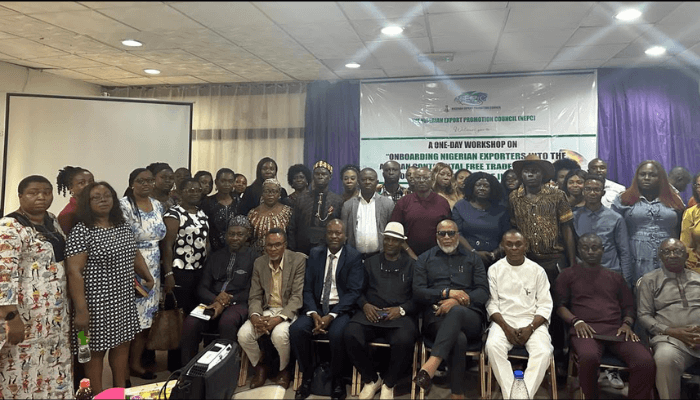NEPC storms PH with AfCFTA’s GTI strategies, reveals products that trade fast in Africa
The Nigerian Export Promotion Council (NEPC) has moved to the south-south with strategies to mobilise the region for participation in the Guided Trade Initiative (GTI) of the African Continental Trade Agreement (AfCFTA).
This is as the Council also revealed products that move fast in intra-Africa trade.
These were highlighted in the keynote speech presented by Nonye Ayeni, the Executive Director/Chief Executive Officer of the NEPC, at the AfCFTA GTI workshop in Port Harcourt on Onboarding Nigerian Exporters into the AfCFTA through the GTI.
The keynote address, which was delivered on CEO’s behalf by Arnold Jackson (Director, State Offices Coordinating Department, NEPC Headquarters), said Nigeria has joined in the GTI which now has 24 countries after the initial group of five.
She said the last Intra-Africa Trade Fair (IATF) held in Algiers (Algeria), Nigerian enterprises generated millions of Dollars in signed deals and Nigeria won the ‘Best Pavilion for Doing Business’.
She said the range of products being prioritized under the expanded GTI are value-added agricultural products, manufactured products, garment & textile, pharmaceuticals, automobiles, and services, all of which are in abundance in Nigeria.
Ayeni said the day’s focus was to ensure that Nigerian exporters were not left behind. “We must actively position our businesses especially SMEs to seize the early mover advantages that GTI offers.”
She said Nigerian exporters now have access to a continental market where over 90% of tariffs will gradually be eliminated. “This means reduced costs and increased competitiveness for Nigerian products and services.”
She said many FG agencies were poised to help Nigerian entrepreneurs to play big in AfCFTA. The NEPC boss mentioned ways of supporting SMEs to hook up bigtime in AfCFTA, such as capacity building through training exporters on AfCFTA protocols, rules of origin, standards, and market requirements; etc.
Read also: Nigeria’s non-oil export hits $1.79bn in Q1, 2025 – NEPC
She also talked about export financing including expanding access to financing instruments that help exporters scale production and meet demand; digital platforms such as leveraging technology for market intelligence, e-certificates of origin, and trade documentation.
She said the opportunities offered by AfCFTA were in form of give-and-take, for Nigeria to fully benefit, exporters must rise up to the challenges by ensuring compliance with quality standards and certification. It also requires building competitiveness through innovation and value-addition; collaborating across sectors to create regional value chains; and actively engaging with NEPC and other agencies to address challenges encountered during GTI participation.
She said: “In conclusion, the Guided Trade Initiative is the Special Purpose Vehicle (SPV) to the African Continental Free Trade Area. Let us be the generation of Nigeria business leaders who looked out at the continent and saw not barriers, but boundless opportunities. Let us be the ones who moved from aspiration to operation, who turned the promise of 1.4 billion people into prosperity for our people.
“Together, let us make the Guided Trade Initiative the springboard for Nigeria’s exporters to conquer African markets and beyond.”
Arnold added that NEPC wants to mainstream the initiative because each of the 774 local government areas in Nigeria has one thing to produce and export.
In a welcome address, Benedict Itegbe, the NEPC regional coordinator, harped on the need for Africans to trade among themselves to unlock the major opportunities that are available in the continent. To that extent, he said, AfCFTA Nigeria has been able to create structures and platforms that would facilitate trading among African nations with the GTI.
He said: “First stage was a huge success, second stage is ongoing and today we have the privilege of having some experienced professionals in the venue to explain the processes with all round information on the opportunities.
“We have a lot of women in our midst. We are committed to empowering women in non-oil export. We are all aware of our latest partnership with World Trade Centre (WTC) and the World Trade Organisation (WTO) headed by our own sister (Ngozi Okonjo-Iweala) and a lot have been done to empower women through discoveries and grant.”
Promotion of non-oil export has been intensive in the Niger Delta in recent years.

